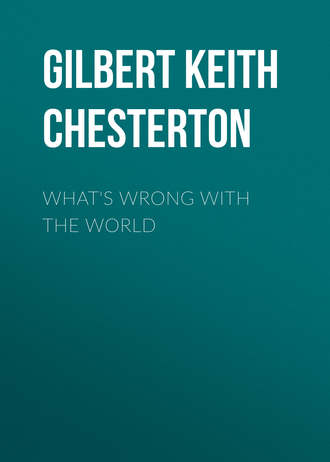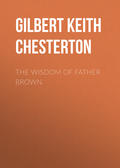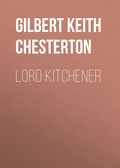
Гилберт Кит Честертон
What's Wrong with the World
XI. THE SCHOOL FOR HYPOCRITES
These are the false accusations; the accusation of classicism, the accusation of cruelty, and the accusation of an exclusiveness based on perfection of pedigree. English public-school boys are not pedants, they are not torturers; and they are not, in the vast majority of cases, people fiercely proud of their ancestry, or even people with any ancestry to be proud of. They are taught to be courteous, to be good tempered, to be brave in a bodily sense, to be clean in a bodily sense; they are generally kind to animals, generally civil to servants, and to anyone in any sense their equal, the jolliest companions on earth. Is there then anything wrong in the public-school ideal? I think we all feel there is something very wrong in it, but a blinding network of newspaper phraseology obscures and entangles us; so that it is hard to trace to its beginning, beyond all words and phrases, the faults in this great English achievement.
Surely, when all is said, the ultimate objection to the English public school is its utterly blatant and indecent disregard of the duty of telling the truth. I know there does still linger among maiden ladies in remote country houses a notion that English schoolboys are taught to tell the truth, but it cannot be maintained seriously for a moment. Very occasionally, very vaguely, English schoolboys are told not to tell lies, which is a totally different thing. I may silently support all the obscene fictions and forgeries in the universe, without once telling a lie. I may wear another man’s coat, steal another man’s wit, apostatize to another man’s creed, or poison another man’s coffee, all without ever telling a lie. But no English school-boy is ever taught to tell the truth, for the very simple reason that he is never taught to desire the truth. From the very first he is taught to be totally careless about whether a fact is a fact; he is taught to care only whether the fact can be used on his “side” when he is engaged in “playing the game.” He takes sides in his Union debating society to settle whether Charles I ought to have been killed, with the same solemn and pompous frivolity with which he takes sides in the cricket field to decide whether Rugby or Westminster shall win. He is never allowed to admit the abstract notion of the truth, that the match is a matter of what may happen, but that Charles I is a matter of what did happen – or did not. He is Liberal or Tory at the general election exactly as he is Oxford or Cambridge at the boat race. He knows that sport deals with the unknown; he has not even a notion that politics should deal with the known. If anyone really doubts this self-evident proposition, that the public schools definitely discourage the love of truth, there is one fact which I should think would settle him. England is the country of the Party System, and it has always been chiefly run by public-school men. Is there anyone out of Hanwell who will maintain that the Party System, whatever its conveniences or inconveniences, could have been created by people particularly fond of truth?
The very English happiness on this point is itself a hypocrisy. When a man really tells the truth, the first truth he tells is that he himself is a liar. David said in his haste, that is, in his honesty, that all men are liars. It was afterwards, in some leisurely official explanation, that he said the Kings of Israel at least told the truth. When Lord Curzon was Viceroy he delivered a moral lecture to the Indians on their reputed indifference to veracity, to actuality and intellectual honor. A great many people indignantly discussed whether orientals deserved to receive this rebuke; whether Indians were indeed in a position to receive such severe admonition. No one seemed to ask, as I should venture to ask, whether Lord Curzon was in a position to give it. He is an ordinary party politician; a party politician means a politician who might have belonged to either party. Being such a person, he must again and again, at every twist and turn of party strategy, either have deceived others or grossly deceived himself. I do not know the East; nor do I like what I know. I am quite ready to believe that when Lord Curzon went out he found a very false atmosphere. I only say it must have been something startlingly and chokingly false if it was falser than that English atmosphere from which he came. The English Parliament actually cares for everything except veracity. The public-school man is kind, courageous, polite, clean, companionable; but, in the most awful sense of the words, the truth is not in him.
This weakness of untruthfulness in the English public schools, in the English political system, and to some extent in the English character, is a weakness which necessarily produces a curious crop of superstitions, of lying legends, of evident delusions clung to through low spiritual self-indulgence. There are so many of these public-school superstitions that I have here only space for one of them, which may be called the superstition of soap. It appears to have been shared by the ablutionary Pharisees, who resembled the English public-school aristocrats in so many respects: in their care about club rules and traditions, in their offensive optimism at the expense of other people, and above all in their unimaginative plodding patriotism in the worst interests of their country. Now the old human common sense about washing is that it is a great pleasure. Water (applied externally) is a splendid thing, like wine. Sybarites bathe in wine, and Nonconformists drink water; but we are not concerned with these frantic exceptions. Washing being a pleasure, it stands to reason that rich people can afford it more than poor people, and as long as this was recognized all was well; and it was very right that rich people should offer baths to poor people, as they might offer any other agreeable thing – a drink or a donkey ride. But one dreadful day, somewhere about the middle of the nineteenth century, somebody discovered (somebody pretty well off) the two great modern truths, that washing is a virtue in the rich and therefore a duty in the poor. For a duty is a virtue that one can’t do. And a virtue is generally a duty that one can do quite easily; like the bodily cleanliness of the upper classes. But in the public-school tradition of public life, soap has become creditable simply because it is pleasant. Baths are represented as a part of the decay of the Roman Empire; but the same baths are represented as part of the energy and rejuvenation of the British Empire. There are distinguished public school men, bishops, dons, headmasters, and high politicians, who, in the course of the eulogies which from time to time they pass upon themselves, have actually identified physical cleanliness with moral purity. They say (if I remember rightly) that a public-school man is clean inside and out. As if everyone did not know that while saints can afford to be dirty, seducers have to be clean. As if everyone did not know that the harlot must be clean, because it is her business to captivate, while the good wife may be dirty, because it is her business to clean. As if we did not all know that whenever God’s thunder cracks above us, it is very likely indeed to find the simplest man in a muck cart and the most complex blackguard in a bath.
There are other instances, of course, of this oily trick of turning the pleasures of a gentleman into the virtues of an Anglo-Saxon. Sport, like soap, is an admirable thing, but, like soap, it is an agreeable thing. And it does not sum up all mortal merits to be a sportsman playing the game in a world where it is so often necessary to be a workman doing the work. By all means let a gentleman congratulate himself that he has not lost his natural love of pleasure, as against the blase, and unchildlike. But when one has the childlike joy it is best to have also the childlike unconsciousness; and I do not think we should have special affection for the little boy who ever lastingly explained that it was his duty to play Hide and Seek and one of his family virtues to be prominent in Puss in the Corner.
Another such irritating hypocrisy is the oligarchic attitude towards mendicity as against organized charity. Here again, as in the case of cleanliness and of athletics, the attitude would be perfectly human and intelligible if it were not maintained as a merit. Just as the obvious thing about soap is that it is a convenience, so the obvious thing about beggars is that they are an inconvenience. The rich would deserve very little blame if they simply said that they never dealt directly with beggars, because in modern urban civilization it is impossible to deal directly with beggars; or if not impossible, at least very difficult. But these people do not refuse money to beggars on the ground that such charity is difficult. They refuse it on the grossly hypocritical ground that such charity is easy. They say, with the most grotesque gravity, “Anyone can put his hand in his pocket and give a poor man a penny; but we, philanthropists, go home and brood and travail over the poor man’s troubles until we have discovered exactly what jail, reformatory, workhouse, or lunatic asylum it will really be best for him to go to.” This is all sheer lying. They do not brood about the man when they get home, and if they did it would not alter the original fact that their motive for discouraging beggars is the perfectly rational one that beggars are a bother. A man may easily be forgiven for not doing this or that incidental act of charity, especially when the question is as genuinely difficult as is the case of mendicity. But there is something quite pestilently Pecksniffian about shrinking from a hard task on the plea that it is not hard enough. If any man will really try talking to the ten beggars who come to his door he will soon find out whether it is really so much easier than the labor of writing a check for a hospital.
XII. THE STALENESS OF THE NEW SCHOOLS
For this deep and disabling reason therefore, its cynical and abandoned indifference to the truth, the English public school does not provide us with the ideal that we require. We can only ask its modern critics to remember that right or wrong the thing can be done; the factory is working, the wheels are going around, the gentlemen are being produced, with their soap, cricket and organized charity all complete. And in this, as we have said before, the public school really has an advantage over all the other educational schemes of our time. You can pick out a public-school man in any of the many companies into which they stray, from a Chinese opium den to a German Jewish dinner-party. But I doubt if you could tell which little match girl had been brought up by undenominational religion and which by secular education. The great English aristocracy which has ruled us since the Reformation is really, in this sense, a model to the moderns. It did have an ideal, and therefore it has produced a reality.
We may repeat here that these pages propose mainly to show one thing: that progress ought to be based on principle, while our modern progress is mostly based on precedent. We go, not by what may be affirmed in theory, but by what has been already admitted in practice. That is why the Jacobites are the last Tories in history with whom a high-spirited person can have much sympathy. They wanted a specific thing; they were ready to go forward for it, and so they were also ready to go back for it. But modern Tories have only the dullness of defending situations that they had not the excitement of creating. Revolutionists make a reform, Conservatives only conserve the reform. They never reform the reform, which is often very much wanted. Just as the rivalry of armaments is only a sort of sulky plagiarism, so the rivalry of parties is only a sort of sulky inheritance. Men have votes, so women must soon have votes; poor children are taught by force, so they must soon be fed by force; the police shut public houses by twelve o’clock, so soon they must shut them by eleven o’clock; children stop at school till they are fourteen, so soon they will stop till they are forty. No gleam of reason, no momentary return to first principles, no abstract asking of any obvious question, can interrupt this mad and monotonous gallop of mere progress by precedent. It is a good way to prevent real revolution. By this logic of events, the Radical gets as much into a rut as the Conservative. We meet one hoary old lunatic who says his grandfather told him to stand by one stile. We meet another hoary old lunatic who says his grandfather told him only to walk along one lane.
I say we may repeat here this primary part of the argument, because we have just now come to the place where it is most startlingly and strongly shown. The final proof that our elementary schools have no definite ideal of their own is the fact that they so openly imitate the ideals of the public schools. In the elementary schools we have all the ethical prejudices and exaggerations of Eton and Harrow carefully copied for people to whom they do not even roughly apply. We have the same wildly disproportionate doctrine of the effect of physical cleanliness on moral character. Educators and educational politicians declare, amid warm cheers, that cleanliness is far more important than all the squabbles about moral and religious training. It would really seem that so long as a little boy washes his hands it does not matter whether he is washing off his mother’s jam or his brother’s gore. We have the same grossly insincere pretense that sport always encourages a sense of honor, when we know that it often ruins it. Above all, we have the same great upperclass assumption that things are done best by large institutions handling large sums of money and ordering everybody about; and that trivial and impulsive charity is in some way contemptible. As Mr. Blatchford says, “The world does not want piety, but soap – and Socialism.” Piety is one of the popular virtues, whereas soap and Socialism are two hobbies of the upper middle class.
These “healthy" ideals, as they are called, which our politicians and schoolmasters have borrowed from the aristocratic schools and applied to the democratic, are by no means particularly appropriate to an impoverished democracy. A vague admiration for organized government and a vague distrust of individual aid cannot be made to fit in at all into the lives of people among whom kindness means lending a saucepan and honor means keeping out of the workhouse. It resolves itself either into discouraging that system of prompt and patchwork generosity which is a daily glory of the poor, or else into hazy advice to people who have no money not to give it recklessly away. Nor is the exaggerated glory of athletics, defensible enough in dealing with the rich who, if they did not romp and race, would eat and drink unwholesomely, by any means so much to the point when applied to people, most of whom will take a great deal of exercise anyhow, with spade or hammer, pickax or saw. And for the third case, of washing, it is obvious that the same sort of rhetoric about corporeal daintiness which is proper to an ornamental class cannot, merely as it stands, be applicable to a dustman. A gentleman is expected to be substantially spotless all the time. But it is no more discreditable for a scavenger to be dirty than for a deep-sea diver to be wet. A sweep is no more disgraced when he is covered with soot than Michael Angelo when he is covered with clay, or Bayard when he is covered with blood. Nor have these extenders of the public-school tradition done or suggested anything by way of a substitute for the present snobbish system which makes cleanliness almost impossible to the poor; I mean the general ritual of linen and the wearing of the cast-off clothes of the rich. One man moves into another man’s clothes as he moves into another man’s house. No wonder that our educationists are not horrified at a man picking up the aristocrat’s second-hand trousers, when they themselves have only taken up the aristocrat’s second-hand ideas.
XIII. THE OUTLAWED PARENT
There is one thing at least of which there is never so much as a whisper inside the popular schools; and that is the opinion of the people. The only persons who seem to have nothing to do with the education of the children are the parents. Yet the English poor have very definite traditions in many ways. They are hidden under embarrassment and irony; and those psychologists who have disentangled them talk of them as very strange, barbaric and secretive things. But, as a matter of fact, the traditions of the poor are mostly simply the traditions of humanity, a thing which many of us have not seen for some time. For instance, workingmen have a tradition that if one is talking about a vile thing it is better to talk of it in coarse language; one is the less likely to be seduced into excusing it. But mankind had this tradition also, until the Puritans and their children, the Ibsenites, started the opposite idea, that it does not matter what you say so long as you say it with long words and a long face. Or again, the educated classes have tabooed most jesting about personal appearance; but in doing this they taboo not only the humor of the slums, but more than half the healthy literature of the world; they put polite nose-bags on the noses of Punch and Bardolph, Stiggins and Cyrano de Bergerac. Again, the educated classes have adopted a hideous and heathen custom of considering death as too dreadful to talk about, and letting it remain a secret for each person, like some private malformation. The poor, on the contrary, make a great gossip and display about bereavement; and they are right. They have hold of a truth of psychology which is at the back of all the funeral customs of the children of men. The way to lessen sorrow is to make a lot of it. The way to endure a painful crisis is to insist very much that it is a crisis; to permit people who must feel sad at least to feel important. In this the poor are simply the priests of the universal civilization; and in their stuffy feasts and solemn chattering there is the smell of the baked meats of Hamlet and the dust and echo of the funeral games of Patroclus.
The things philanthropists barely excuse (or do not excuse) in the life of the laboring classes are simply the things we have to excuse in all the greatest monuments of man. It may be that the laborer is as gross as Shakespeare or as garrulous as Homer; that if he is religious he talks nearly as much about hell as Dante; that if he is worldly he talks nearly as much about drink as Dickens. Nor is the poor man without historic support if he thinks less of that ceremonial washing which Christ dismissed, and rather more of that ceremonial drinking which Christ specially sanctified. The only difference between the poor man of to-day and the saints and heroes of history is that which in all classes separates the common man who can feel things from the great man who can express them. What he feels is merely the heritage of man. Now nobody expects of course that the cabmen and coal-heavers can be complete instructors of their children any more than the squires and colonels and tea merchants are complete instructors of their children. There must be an educational specialist in loco parentis. But the master at Harrow is in loco parentis; the master in Hoxton is rather contra parentem. The vague politics of the squire, the vaguer virtues of the colonel, the soul and spiritual yearnings of a tea merchant, are, in veritable practice, conveyed to the children of these people at the English public schools. But I wish here to ask a very plain and emphatic question. Can anyone alive even pretend to point out any way in which these special virtues and traditions of the poor are reproduced in the education of the poor? I do not wish the coster’s irony to appeal as coarsely in the school as it does in the tap room; but does it appear at all? Is the child taught to sympathize at all with his father’s admirable cheerfulness and slang? I do not expect the pathetic, eager pietas of the mother, with her funeral clothes and funeral baked meats, to be exactly imitated in the educational system; but has it any influence at all on the educational system? Does any elementary schoolmaster accord it even an instant’s consideration or respect? I do not expect the schoolmaster to hate hospitals and C.O.S. centers so much as the schoolboy’s father; but does he hate them at all? Does he sympathize in the least with the poor man’s point of honor against official institutions? Is it not quite certain that the ordinary elementary schoolmaster will think it not merely natural but simply conscientious to eradicate all these rugged legends of a laborious people, and on principle to preach soap and Socialism against beer and liberty? In the lower classes the school master does not work for the parent, but against the parent. Modern education means handing down the customs of the minority, and rooting out the customs of the majority. Instead of their Christlike charity, their Shakespearean laughter and their high Homeric reverence for the dead, the poor have imposed on them mere pedantic copies of the prejudices of the remote rich. They must think a bathroom a necessity because to the lucky it is a luxury; they must swing Swedish clubs because their masters are afraid of English cudgels; and they must get over their prejudice against being fed by the parish, because aristocrats feel no shame about being fed by the nation.






